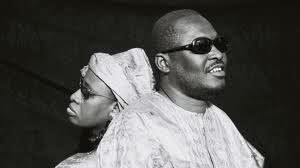Forget Brad and Angelina, Amadou & Mariam are a true modern-day power couple.
After both became incurably blind during childhood, the couple met at Mali’s Institute for the Young Blind, and fell in love through through their shared passion for music.
Nearly four decades of globe-trotting, Grammy-nominated, assumption-defying music-making later, Amadou Bagayoko and Mariam Doumbia seem just as enthralled with music, life, love and each other.
Amadou & Mariam’s Eclipse, a headlining act in this year’s Melbourne Festival, is not exactly your run-of-the-mill gig. Nearly the entire performance takes place in complete darkness, and this is probably the only Tone Deaf-reviewed gig that credits a Scent Engineer (Jose Martin).
For the hour and a half performance, Amadou & Mariam invite the audience to experience music the way they do. Ushers are kitted out with infrared glasses and walkie-talkies; not even an ‘EXIT’ sign is visible.
It’s hard to believe that the performance passed Australia’s ruthless OH&S regulations, but the effort is worth it, as Amadou & Mariam’s jubilant afro-blues becomes an all-encompassing presence in the pristine acoustics of the blacked-out Elisabeth Murdoch Hall. Every nuance in sound is clear; the audience is saturated in sound.
Eclipse is strongly driven by the narrative of Amadou and Miriam’s love story. As the performance begins, fragrant incense wafts through the air, mingled with the sounds of cocks crowing and mopeds whizzing by, transporting the audience to a morning in Bamako, Mali’s capital, the hometown of Amadou & Mariam.
Love Music?
Get your daily dose of metal, rock, indie, pop, and everything else in between.
Tracks are interwoven with a poetic biography of Amadou & Mariam’s childhood coming to terms with blindness (“[Mariam] must not be swallowed by blindness”), growing passion for music (“Amadou is seduced by the six strings of the guitar”), courtship, and the couple’s rise to global success, all of which are narrated by the rich and engaging voice of Hamadoun Tandina.
The set wanders through the greatest hits of Amadou & Mariam’s musical archive, tracks taken from their early independent records, to their 2005 breakthrough Dimanche à Bamako, up to 2012’s critically-acclaimed Folila.
During the final songs the darkness lifts, revealing Amadou & Mariam dressed in glistening Malian clothes, and their touring band, who encourage the audience to get up and dance. Bagayoko is a guitarist and vocalist, Doumbia is a vocalist; the touring band plays a mix of Malian and Western instruments.
The resulting sound is a full and joyful fusion of Western and African musical traditions. The song ‘Sabali’ shows this fusion; the slow burner starts with unashamedly nostalgic ‘80s synths blended with distinctive a Malian melody, and unfolds into a synth-heavy richly melodic love song.
While unfortunately often relegated to the anonymous arena of ‘world music’ by the larger public, Amadou & Mariam’s unique talent has been clearly recognised by the music industry.
They have collaborated with industry heavyweights Santigold, Damon Albarn of Blur and Gorillaz, Kyp of TV On The Radio, Manu Chao, Jake Shears of Scissor Sisters, Theophilus London, Nick Zinner of the Yeah Yeah Yeahs, and Akon. U2 and Coldplay have invited the couple to support legs of their tours.
And in the ultimate modern-day marker of success, Amadou & Mariam have met Obama, and performed at the 2009 Nobel Peace Prize Concert at which Obama received his Nobel Peace Prize.
Bagayoko’s powerful rendition of the bluesy ‘A Chacun Son Probleme’ (whose message roughly translates to “to each their own”) seems especially heartfelt given recent attempts by radical Islamists in Mali to ban live music.
The couple is commendably involved with non-for-profits in Mali and elsewhere, including Save The Children, End Water Poverty, World Food Program and Sightsavers.
Throughout 2013 Amadou & Mariam have held a series of concerts in Parisian ghettos, aimed at building solidarity and culture in areas that are the home of many disadvantaged and disenfranchised migrants of African descent. This would be the equivalent of Gotye touring in Frankston.
Whilst Amadou & Mariam are active in social justice realms, both musically and otherwise, their most successful songs are deeply personal and heartfelt. “Beaux Dimanches” is a jubilant song celebrating Amadou & Mariam’s wedding day. ‘Je Pense A Toi’ is a heartfelt downtempo call-and-response song, where Bagayoko and Doumbia sing that they dream only of each other.
Amadou & Mariam are sincere without being saccharine, their earnestness and lack of irony is a refreshing change from Melbourne’s self-conscious hipster scene. Bagayoko and Doumbia love each other with a rare strength and unwavering belief, and turn this into astounding music.

































